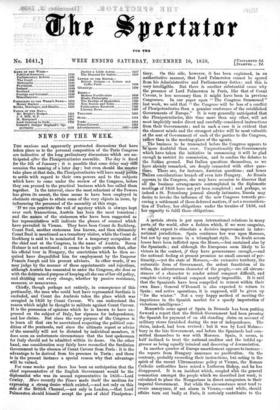NEWS OF THE WEEK.
THE anxious and apparently protracted discussions that have taken place as to the personal composition of the Paris Congress are indicative of the long preliminary discussions which are an- ticipated after the Plenipotentiaries assemble. The day is fixed for the 5th of January ; it is possible that some delay may still occasion the naming of a later day ; but even should the muster take place at that date, the Plenipotentiaries will have many points to settle with regard to their own powers and to the subjects which have to come under the review of the Congress, before they can proceed to the practical" business which has called them together. In the interval, since the most reluctant of the Powers has given its assent, the time seems to have been employed in obstinate struggles to attain some of the very objects in issue, by influencing the personnel of the assembly at this stage.
'If we can penetrate the veil of mystery which is always kept over such transactions, Austria has been the most tenacious ; and the "mines of the statesmen Who have been suggested as her representatives will indicate the phases of counsel which have prevailed in Vienna. They have been Count de Rechberg, Count Bu.ol, another statesman less known, and then ultimately Count Buol is mentioned as a transitory visitor, while the Count de Rechberg is said to be nominated for a temporary occupation of the chief seat at the Congress, in the name of Austria. Baron Hubner is not mentioned ; it seems to be quite certain that, after his official tour in Hungary, the convictions which. he then ac- quired have disqualified him for employment by the Emperor Francis Joseph and his present advisers. In other words, if we may judge by the manner of these appointments and rejections, although Austria has consented to enter the Congress, she does so with the determined purpose of keeping all she can of her old policy, and shutting out every change, whether by passive resistance, menaces, or mancenvres.
Chiefly, though perhaps not entirely, in consequence of this pertinacity, the man who could best have represented Sardinia is excluded, and Count des Ambrois takes the place which was occupied in 1856 by Count Cavour. We can understand the reason which might be thought to militate against Count Cavour.
It is the possession of opinions which he is known to have ex- pressed on the subject of Italy, her ripeness for independence, and her claims. But since the very purpose of the Congress is to learn all that can be ascertained respecting the political con- dition of the peninsula, and since the ultimate report or advice of the assembly will not be dictated by individual members, it does seem an unfortunate circumstance that the best spokesman for Italy should not be admitted within its doors. On the other hand, one consideration may fairly have reconciled the Sardinian Government to the absence of Count Cavour from Paris : it is the advantage to be derived from his presence in Turin ; and there is in the present instance a special reason why that advantage will be valued.
For some weeks past there has been an anticipation that the chief representative of the English Government would be the diplomatist who was its second representative in 1856—Lord Cowley. More recently the Times made itself the medium for expressing a. strong desire which existed,—and not only on this side of the British Channel,—not only in London,—that Lord Palmerston should himself accept the post of chief Plenipoten-
Itiary. On this side, however, it has been explained, in an authoritative manner, that Lord Palmerston cannot be spared from his Administrative and Parliamentary duties ; and this is very intelligible. But there is another substantial cause why the presence of Lord Palmerston in Paris, like that of Count Cavour, is less necessary than it might have been in previous Congresses. In our paper upon "The Congress Summoned" last week, we said that " the Congress will be less of a conflict of Plenipotentiaries than a genuine conference of the established Governments of Europe." It is very generally anticipated that the Plenipotentiaries, this time more than any other, will act most implicitly under direct and carefully-considered instructions from their Governments ; and in such a case it is evident that the clearest minds and the strongest advice will be most valuable at _the seat of Government of each of the parties to the Congress, i4er than in the meeting-place of the agents.
The business to be transacted before the Congress appears to re*ore doubtful than ever. Unquestionably the Governments which have taken the initiative in summoning it will be glad enough to restrict its commission, and to confine the debates to the Italian ground. But Italian questions themselves, as we have already remarked, are deeply connected with other ques- thus. There are, for instance, Austrian questions ; and hence Dalian considerations branch off even into Hungary. As Russia appear* in the Congress, she may have occasion to discover that all 903 business arrangements contemplated in the diplomatic meetings of 1856 have not yet been completed ; and perhaps, as indeed a St. Petersburg journal already intimates, Russia may desire to invoke the influence of the new Congress towards pro- curing n Settlement of those deferred matters, if not a reconsidera- tion of Turkey, her obligations under the treaties of 1856, and her capacity to fulfil those obligations.


























